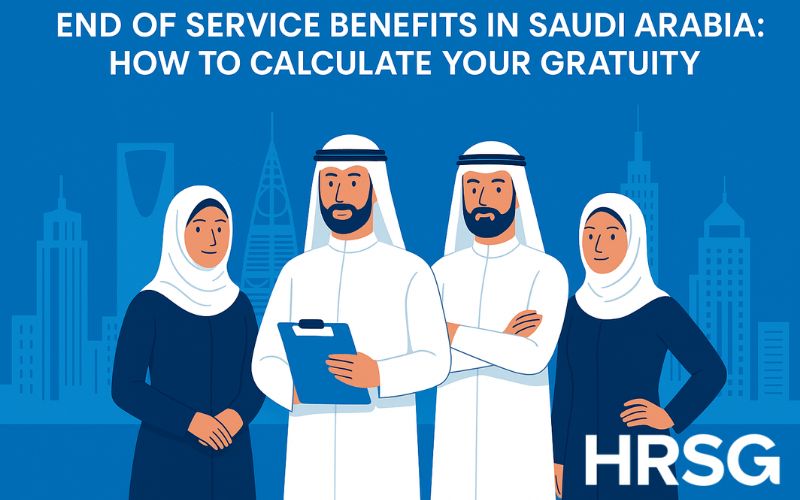Think of the end-of-service benefits in Saudi as a financial cushion for employees at the end of their contract. Whether you’re moving on to a better opportunity or heading home after years in the Kingdom, the end-of-service benefit, also known as gratuity, is a legal right under Saudi Labor Law. The good part? It applies to Saudi nationals as well as expatriates.
In this blog, we will break down the concept of gratuity and help you understand the following things:
- What are the end-of-service benefits?
- Law addressing end-of-service benefits in Saudi Arabia
- End-of-service benefits in Saudi
- Who is entitled to gratuity benefits?
- How to calculate your gratuity
What are the End of Service Benefits?
Gratuity, also known as End of Service Benefits (EOSB), is a financial reward given by an employer to an employee in recognition of their dedication, hard work, and service over the course of their employment. It is typically paid out when the employment relationship ends, whether due to resignation or termination.
Under Saudi labor law, an employee who resigns becomes eligible for gratuity after completing two years of continuous service with the same company.
On the other hand, if the employee is terminated, they are entitled to the full accrued gratuity provided they have completed at least one year with the company. For employers, gratuity represents a financial obligation that must be accounted for.
According to Article 2 of the Saudi Labor Law, all fixed components of an employee’s salary are included in the calculation of end-of-service benefits in Saudi Arabia. These include:
- Basic salary
- Housing allowance
- Transportation allowance
- Mobile allowance
On the other hand, variable benefits, such as sales incentives, ticket allowances, and bonuses, are excluded from the calculation as they depend on other factors.
Law Addressing End-of-Service Benefits in Saudi Arabia
The end-of-service benefits in Saudi Arabia are governed by the Saudi Labor Law under Articles 84 to 88.
- Article 84: When an employee’s work ends, the employer must pay an end-of-service benefit. This includes:
- Half a month’s salary for each of the first five years of service
- One month’s salary for each year after that
The benefit is based on the employee’s last salary and should also include a proportional amount for any partial year worked.
- Article 85: If the employee resigns:
- They receive one-third of the benefit if they’ve worked between 2 and 5 years
- Two-thirds if they’ve worked more than 5 but less than 10 years
- The full benefit if they’ve worked 10 years or more
- Article 86: It can be agreed that the salary used to calculate the end-of-service benefit does not include certain variable components like commissions or sales percentages.
- Article 87: Despite what’s stated in Article 85, the employee is entitled to the full benefit if they leave due to a situation beyond their control (force majeure). Also, a female employee gets the full benefit if she ends her contract within:
- 6 months of getting married, or
- 3 months after giving birth
- Article 88: When employment ends:
- The employer must pay the employee’s wages and all dues within one week.
- If the employee ends the contract, the employer has up to two weeks to settle the dues.
- The employer can deduct any outstanding work-related debts from the employee’s final payment.
Benefits of End-Of-Service Benefits in Saudi
The end-of-service benefits in Saudi Arabia provide financial security and reward employees for their long-term service commitment.
- EOSB offers a lump sum payment that helps employees manage expenses while transitioning between jobs or planning retirement.
- Knowing there’s a significant reward at the end of long-term service motivates employees to stay longer with the organization.
- The payout can be a key part of an employee’s retirement plan, especially for expatriates returning to their home country.
- It acts as a token of appreciation for an employee’s dedication and years of service to the company.
- In cases where jobs end unexpectedly, EOSB can help cover immediate living expenses or relocation costs.
Who is Entitled to Gratuity Benefits
The end-of-service benefits in Saudi Arabia are provided to both Saudi citizens and expatriate workers, as long as they’re employed under the country’s labor laws. The key factor for eligibility isn’t nationality but rather the length of continuous service with an employer.
Minimum Service Requirements
To qualify for EOSB, an employee must complete a certain period of continuous service. These requirements are set by Saudi labor law and may differ depending on the employment contract type and the industry.
Here’s a simple breakdown of how minimum service requirements affect EOSB eligibility:
If the employer terminates the contract (not due to misconduct):
- Less than 1 year: No EOSB is paid.
- 2 to 5 years: Half a month’s salary for each year of service.
- More than 5 years: Full benefit is paid.
If the employee resigns:
- Less than 2 years: No EOSB
- 2 to 5 years: One-third of the total EOSB
- 5 to 10 years: Two-thirds of the total EOSB
- More than 10 years: Full EOSB
The reason for ending the employment also influences EOSB eligibility:
- Terminated by Employer (No Misconduct): The employee is eligible for EOSB if they meet the required minimum service duration. The payout depends on how long they’ve worked.
- Terminated for Misconduct: In most cases, the employee loses their EOSB, especially if it’s clearly mentioned in their employment contract.
- Mutual Agreement: If both parties agree to end the contract, EOSB is usually paid as per the terms outlined in the mutual agreement.

How To Calculate Your Gratuity
In Saudi Arabia, gratuity payouts are based on two main factors: the employee’s basic salary and how long they’ve worked with the company. Let’s understand the process with an example.
Suppose an employee was terminated by the employer, and there was no misconduct.
Service duration: 7 years and 6 months (i.e., 7.5 years)
Step 1: Consider the Last Monthly Salary
Last Monthly Salary = SAR 11,500
Step 2: Calculate the Benefits for the First 5 Years
For years 1–5, a half-month salary for each of the first five years is required to be calculated. Therefore:
5 years × 0.5 month × SAR 11,500 = SAR 28,750
Step 3: Calculate the Benefits for the Remaining Years
For years 6–7.5 (2.5 years), one full month’s salary for each year is required to be calculated. Therefore:
2.5 years × 1 month × SAR 11,500 = SAR 28,750
Step 4: Calculate the Total EOSB
To calculate the total EOSB, add a half-month salary for each of the first five years and one full month’s salary for each year.
SAR 28,750 (first 5 years) + SAR 28,750 (next 2.5 years) = SAR 57,500
Conclusion
End-of-service benefits in Saudi Arabia are mandatory payments employers make to employees when their job ends. Whether you’re a Saudi national or an expat, end-of-service benefits in Saudi Arabia are a reward for your dedication, service, and time invested in your role.
These benefits offer financial security, reward long-term service, and apply to both Saudis and expats. That being said, gratuity eligibility depends on service duration, with clear rules on how it’s calculated under Saudi labor law.
HRSG is a leading HR services company in Dubai, globally known for its world-class business solutions. Our HR and payroll solution, Octofy®, simplifies and automates the way you manage your workforce. Consequently, it makes HR task management easier, more efficient, and more effective than ever. Contact us today and see what we have for you.



